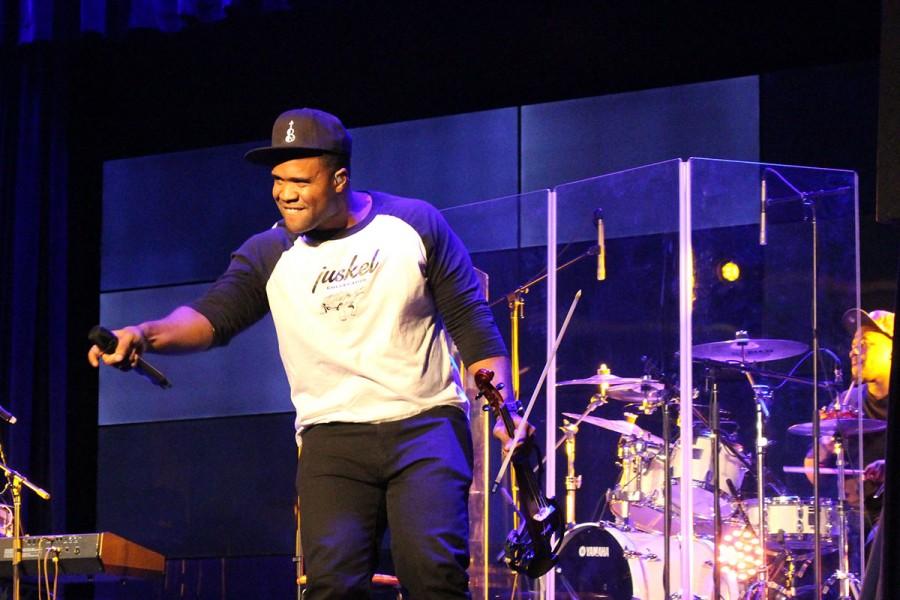Black Violin brings audience out of their seats
Group brings blend of hip-hop and classical to Schofield
More stories from Sam Martinez
Photo by Sam Martinez
Kev Marcus takes a break from the electric Violin to pump up the audience in Schofield.
When visualizing a violin concert on a college campus, one may picture an evening of quietly enjoying the performance while remaining seated.
Thursday night in Schofield auditorium Wil Baptist and Kev Marcus, together known as Black Violin, brought the audience out of their seats and shattered the image of a quiet violin show.
“It was the best concert I think I’ve seen at Eau Claire,” student Becca Dirschl said. “It was definitely more upbeat than (other UW-Eau Claire concerts), you could tell the passion of the performers.”
Black Violin is a group from south Florida fronted by Baptiste and Marcus and backed by DJ SPS and drummer Nat Stokes. Although they are two classically-trained musicians, they incorporate elements of hip-hop into their performances.
Black Violin has worked with artists like Alicia Keys, Kanye West and Aerosmith and even performed at President Obama’s second inauguration in 2013.
Along with encouraging the audience to dance, clap and sing, Baptiste repeatedly urged the crowd to record and post live video to Twitter and other social media.
“You can put (our shows) on YouTube,” Baptiste said. “We encourage that, not only because it’s free publicity, but you know, it’s fun.”
For much of the show the audience was on their feet dancing and singing along with the show.
Sophomore music major Hunter Nicholson said he did not expect the band to bring the type of energy to campus, and he liked that along with the energy, the band could really play their instruments.
Baptiste said they have played 121 shows this year, and it is still easy for them to bring excitement to a new venue each night.
“It’s not hard for us,” Baptiste said. “We’re having a great time and we’re bringing the audience in our world.”
This was the semester’s first installment of the Artist Series, and nearly 500 tickets were sold for the Wednesday show, on a night where the event Yell Like Hell was simultaneously taking place in Zorn Arena.
The Artist Series will continue, with the Pilobolus Dance Theater performing at Gantner concert hall in Haas November 12.



Biplab Poddar • Jun 19, 2018 at 1:48 am
Thanks for sharing this. I’m currently working on the f# minor nocturne! they’re beautiful pieces. After completion of my piano lesson I would go for guitar lessons.Your tips are really helpful.
Don’t get me wrong, you have to be strong and confident to be successful in just about anything you do – but with music, there’s a deeper emotional component to your failures and successes. If you fail a chemistry test, it’s because you either didn’t study enough, or just aren’t that good at chemistry (the latter of which is totally understandable). But if you fail at music, it can say something about your character. It could be because you didn’t practice enough – but, more terrifyingly, it could be because you aren’t resilient enough. Mastering chemistry requires diligence and smarts, but mastering a piano piece requires diligence and smarts, plus creativity, plus the immense capacity to both overcome emotional hurdles, and, simultaneously, to use that emotional component to bring the music alive.
Before I started taking piano, I had always imagined the Conservatory students to have it so good – I mean, for their homework, they get to play guitar, or jam on their saxophone, or sing songs! What fun! Compared to sitting in lab for four hours studying the optical properties of minerals, or discussing Lucretian theories of democracy and politics, I would play piano any day.
But after almost three years of piano at Orpheus Academy, I understand just how naïve this is. Playing music for credit is not “easy” or “fun” or “magical” or “lucky.” Mostly, it’s really freakin’ hard. It requires you to pick apart your piece, play every little segment over and over, dissect it, tinker with it, cry over it, feel completely lame about it, then get over yourself and start practicing again. You have to be precise and diligent, creative and robotic. And then – after all of this – you have to re-discover the emotional beauty in the piece, and use it in your performance.